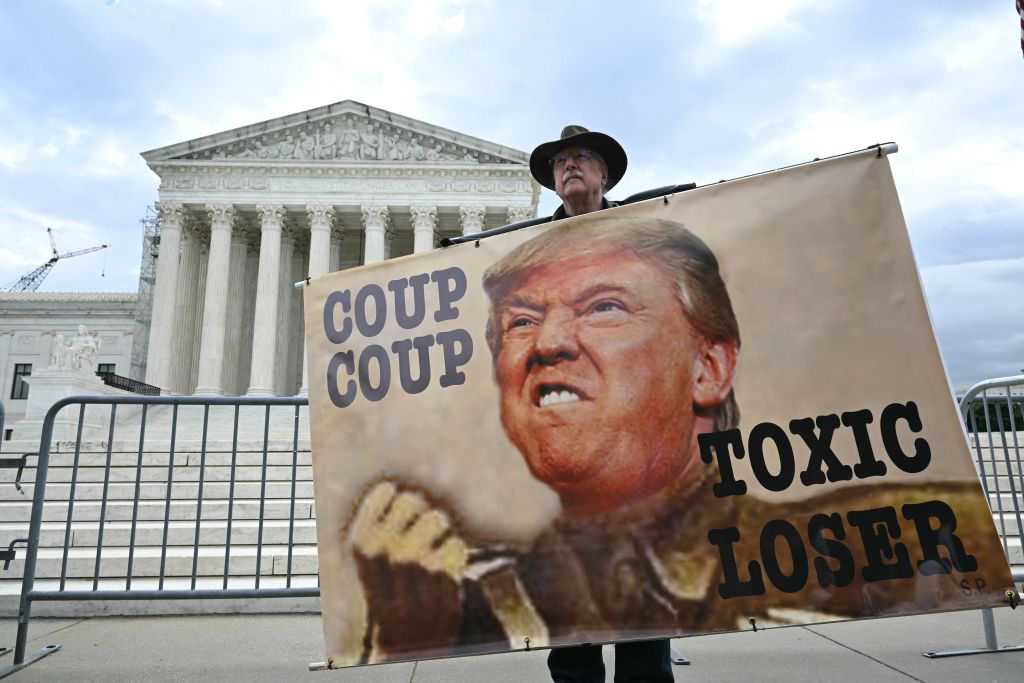One of the founding “Never Trumpers”, Bret Stephens, has used his latest column in the New York Times to distance himself from that effort. He wrote this week that it’s “time to drop the heavy moralising and incessant doomsaying that typified so much of the Never Trump movement”. Stephens’s column has already ignited a fierce debate online, and it raises a charged question: can some Never Trumpers make peace with populism, if not Donald Trump himself?
For years, the question of whether Trump should be the Republican nominee for president consumed the Right — but that topic has now been superseded. After Trump’s hostile takeover of the GOP in 2016, a MAGA establishment has solidified. In the 2024 Republican primary, he garnered the vast majority of Congressional endorsements and won the primaries in a romp. His decisive victory in last month’s election was a major political vindication, but it also changed the terms of the debate going forward. Squabbles over whether pundits should back Trump or not seem increasingly retrospective. Instead, what matters is the direction of policy during his second administration, and what comes afterwards.
That could provide an opportunity for some of Trump’s old critics on the Right, if they show some flexibility. Despite its succinctness in branding, “Never Trump” is not a unified movement, and Never Trumpers have different paths ahead. Some might go the way of the Lincoln Project and essentially become an adjunct of the Democratic Party. Stephens’s column indicates another path: re-engaging with populism in order to diagnose the issues that have given it such resilience and addressing those challenges.
On the level of raw politics, Trump’s conservative critics have strategic incentives to make some populist rapprochement. Turning support for the President-elect or populism into an absolute litmus test — either oppose Trump in all things, or be cast out into the darkness — is no glue for a centre-right political coalition. As it stands, almost every elected Republican has either supported Trump or at least expressed a willingness to help him govern. Insisting that the only decent Republican is one who has joined the “resistance” might win invitations to the MSNBC green room but will have little pull with GOP voters.
As Stephens notes, Never Trump and Trump’s opponents more broadly have hurt themselves by being too closely identified with the technocratic establishment. Combined with the cascade of “expert” failures, the elite-led culture war has alienated much of the American public. Foes of populism invoke the importance of “democratic guardrails”, but Joe Biden’s presidency has been a Gotterdammerung of the norms — from his calls to eliminate the filibuster, to the novel prosecutions of his political opponents, to the recent Hunter Biden pardon.
Foreign policy might also give some Never Trumpers a reason to distance themselves from the Democratic Party. While many of those within the movement emphasise foreign policy as a reason for their opposition to Trump, the security situation under Biden has significantly deteriorated. Instead of seeing him as a chaos agent, much of the American public views the President-elect as representative of stability abroad. New polling from the Manhattan Institute has found that voters gave Trump a 9-point edge over Kamala Harris on foreign policy; after immigration, foreign affairs was judged to be his strongest issue. This is not because the US public has turned isolationist. In the same poll, a plurality of Americans — and a supermajority of Republicans — supported a “peace through strength” foreign policy. But it does indicate that voters have soured on the Biden administration’s combination of sclerosis and NGO-washed “idealism”.
A deeper reckoning is at the heart of Stephens’s column. Trump’s surprise win in 2016 gave birth to an elite-led alliance that portrayed him and his supporters as an existential threat to American democracy. For all its ferocity, this alliance not only failed to stop Trump but indirectly empowered him. It widened the field of political conflict, and its no-enemies-to-the-Left psychology allowed an identity-politics vanguard to capture the Democratic Party. Even by its own standards, that project of existential crisis has a legacy of ashes. Instead, revitalising American democracy might require learning some of the lessons of populism.
Yet even if populists are riding high right now, history has a warning for them. Some 20 years ago, supporters of Pat Buchanan were thoroughly marginalised within the GOP, but the implosion of the Bush presidency allowed for the ascent of the outsider Trump, who carried with him many of the themes of Buchanan’s presidential runs. If Trump and the populists fail to deliver, a similar political revolution could occur.











Join the discussion
Join like minded readers that support our journalism by becoming a paid subscriber
To join the discussion in the comments, become a paid subscriber.
Join like minded readers that support our journalism, read unlimited articles and enjoy other subscriber-only benefits.
Subscribe